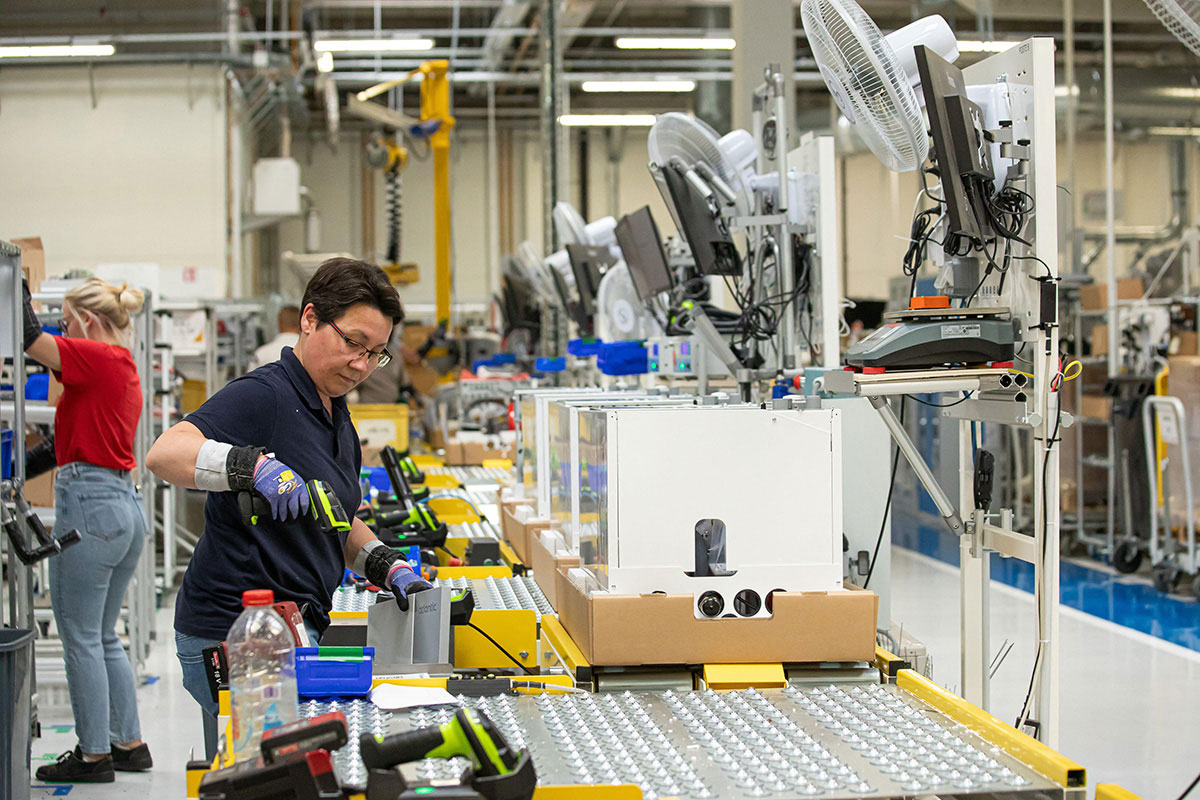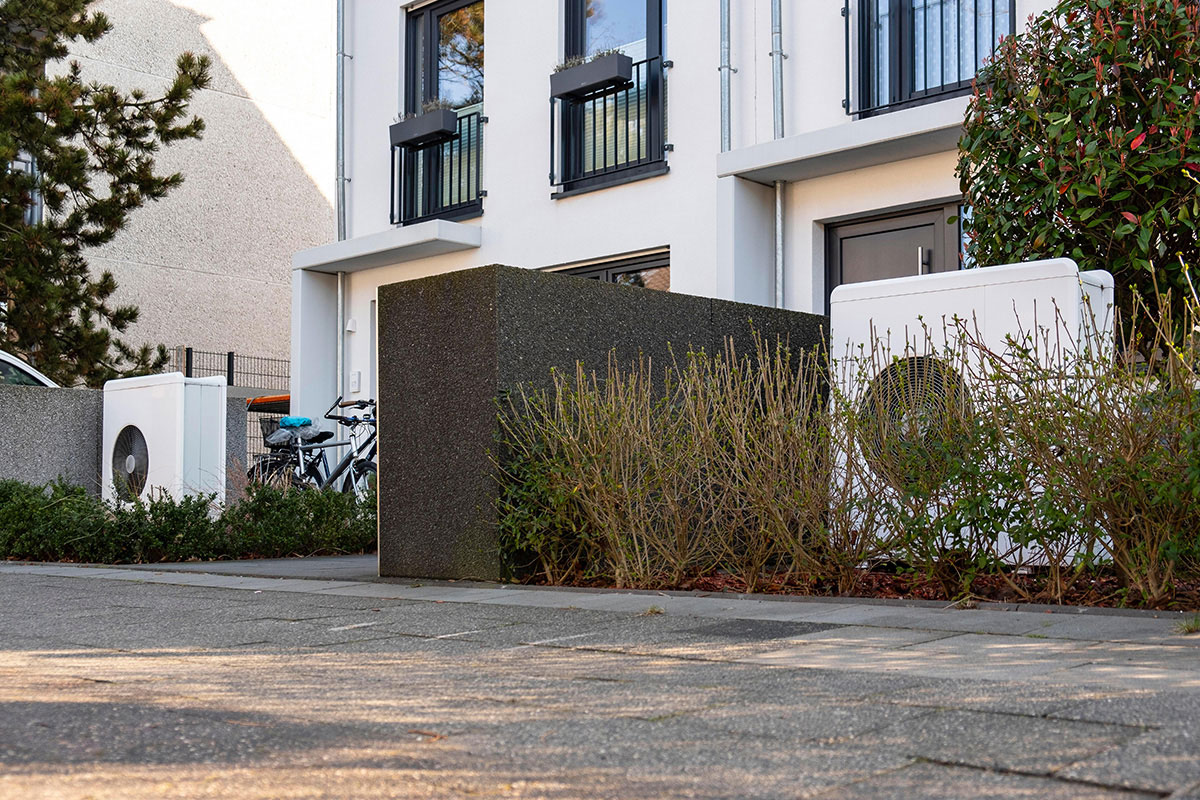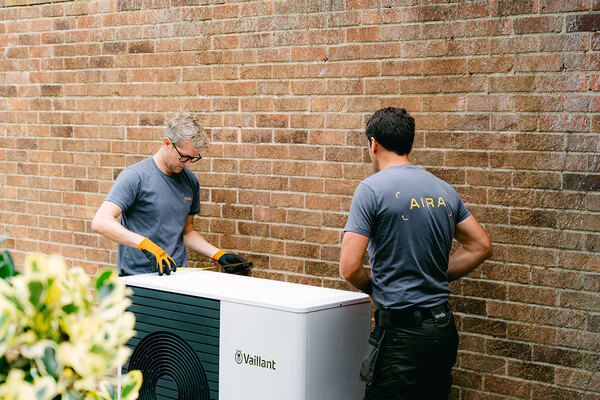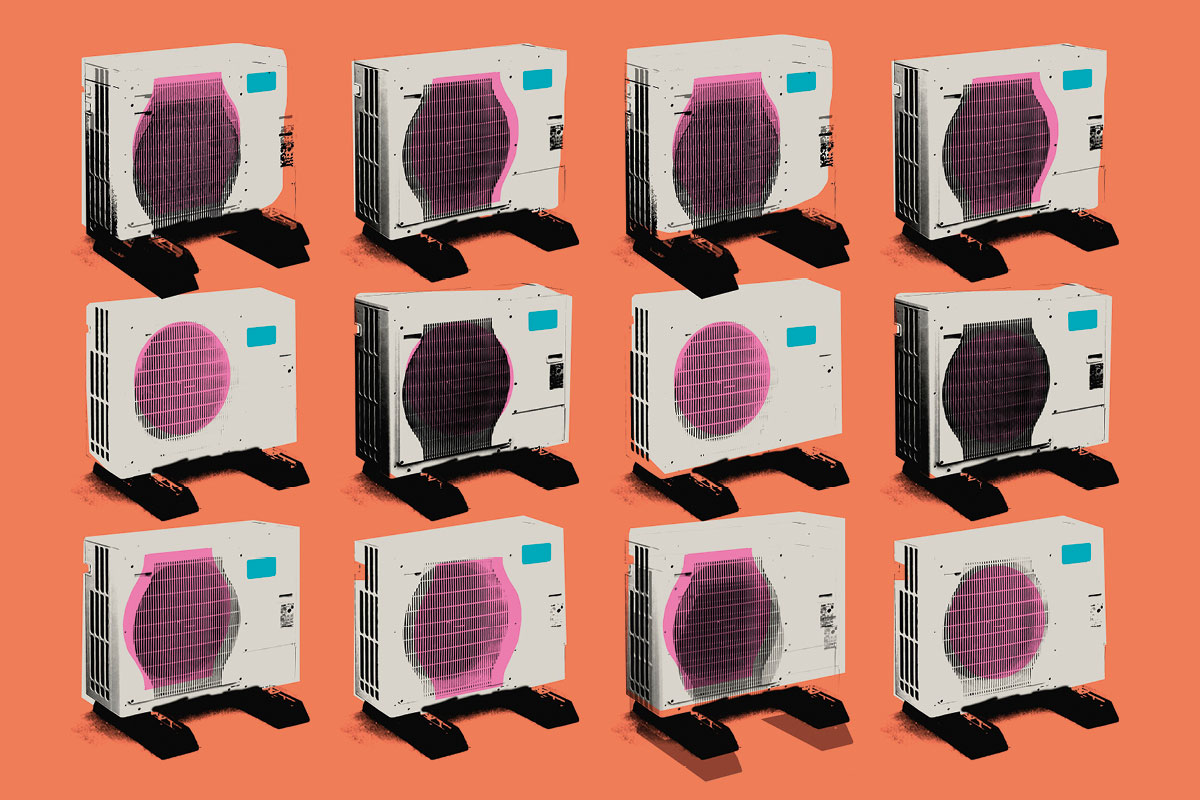The European heat pump race
In the race to net zero, can the new government find the policy mix to overcome structural barriers to mass heat pump adoption? James Riding reports
“We are world leaders in tackling climate change,” claimed Claire Coutinho. She was speaking in December 2023, when she was energy secretary. Sadly, patriotic backslapping does not hold up when it comes to heat pumps, a key tool in decarbonising our homes. Despite a downturn in the European heat pump market last year, France sold 610,830 of these clean energy systems, while Germany sold 438,800 and Sweden 195,550. In the UK, that number was just 60,200.
So what is behind this poor performance, and what can the new government do about it? Inside Housing found that there are major structural challenges that hinder heat pump adoption in the UK, but there are policy interventions that succeeded on the continent.
With Labour about to embark on a Warm Homes Plan to retrofit 19 million homes, here is the story of the UK’s uphill heat pump struggle.
First, an important distinction. According to the UK Heat Pump Association (HPA), many of the European sales figures include air-to-air heat pumps, which are air-conditioning units that heat and cool, whereas the UK statistics do not.
Take the French figures: more than half of those 610,830 sales are air-to-air units, says Charlotte Lee, chief executive of the HPA. Yet even if you halve the figure for a fairer comparison, the French are still decarbonising their homes five times faster than the UK.
‘It always comes down to money’
On a sales-per-head basis, Scandinavian countries are far out in front. In 2023, Sweden sold 41 heat pumps per 1,000 households, compared with 19 in France (including air-to-air) and two in the UK.
“Scandinavia hasn’t had access to cheap gas, like the UK,” says Richard Halsey, innovation director at Energy Systems Catapult, an organisation set up to research net zero. He says these countries were early adopters of carbon taxation to make heat pumps economically competitive. Additionally, their housing stock is newer, making heat pumps more effective than in much of the UK’s older, poorly insulated stock.
This makes France a particularly useful comparison. Like the UK, “France has very old, poor building stock”, says Jenny Russon, senior research, policy and campaigns officer at the MCS Foundation, which certifies the quality of renewable energy schemes across UK homes. In 2023, she published a report explaining how, despite this similarity, our Gallic neighbours enjoy structural advantages when it comes to heat pumps.
The dominance of French nuclear power has lowered the price of electricity, making switching to an electric heat pump financially attractive. “In 2020, running a gas boiler was actually more expensive in France than running a heat pump,” she says. This is not true in the UK.
Also, southern France’s warmer climate and accompanying air-conditioning industry – which uses similar technology to heat pumps – mean that knowledge, business models and consumer understanding of these systems are already in place.
Compared with the UK’s “very stop-start” policy approach, including ill-fated dalliances with hydrogen and biomass technology, Ms Russon says France has steadily built its heat pump market. For more than a decade, its energy efficiency standards for new build homes have accelerated sales. Then, in 2019, Emmanuel Macron’s government introduced grants that nearly doubled installations within a year.
It is not all bad news on our shores, though. A UK government grant called the Boiler Upgrade Scheme (BUS) was hiked by 50% to £7,500 in September 2023, driving demand. According to official figures, there has been an 81% year-on-year increase in applications for the scheme, with a total of 45,579 heat pump applications received by the end of June 2024. Some analysts are forecasting total heat pump sales of 95,000 for 2024, including new builds.
From 2025, the Future Homes Standard will phase out gas boilers in new homes. With the UK building 150,000 or so properties a year, that should increase heat pump sales significantly. And the upcoming third wave of the Social Housing Decarbonisation Fund will include a subsidy for providers that install heat pumps alongside other improvements.
The big challenge is owner-occupier retrofit. An estimated 28 million homes need upgrades to achieve the government’s aim of net zero by 2050; 80% of those currently use gas boilers. Traditionally, the government has pursued a ‘fabric-first’ approach, encouraging insulation upgrades before green heat systems.
What do heat pumps do and why are they good for the climate?

Heat pumps transfer heat energy from the outside air, or a water or ground source, into building interiors. Air-to-air units take heat from the outside air to blow warm air inside, while air-to-water units heat water.
Unlike gas boilers, which run on fossil fuels, heat pumps run on electricity. The UK is well on its way to creating an electricity system that is wholly based on renewable sources. This is because a growing proportion of the energy entering the National Grid now comes from wind, solar power and hydroelectric sources.
However, the Great British Insulation Scheme has retrofitted just 9,400 households since it was launched in March 2023, despite a target of 300,000, suggesting that the woeful take-up of government retrofit schemes is suppressing heat pump numbers.
This is a red herring, according to Jan Rosenow, director of European programmes at the Regulatory Assistance Project, a non-governmental organisation. He says heat pump technology “has moved on” and now “you can definitely heat even a fairly poorly insulated home very comfortably with a heat pump”. The UK government has recognised this, too, scrapping insulation requirements to qualify for the BUS.
So, what is holding the heat pump revolution back? “As with everything, it always comes down to money,” says Jeff House, director of external affairs and policy at Baxi, a maker of boilers and heat pumps. “With the current price of gas and electricity, it’s difficult to make an argument for cost-saving if you’re taking out a combi boiler and putting in an air source heat pump.”
The UK’s big barrier is what heat pump experts call the spark gap: the relative cost of gas and electricity. Currently, this figure is 4.7, meaning electricity is over four times as expensive as gas per unit of energy. As a result, someone who swaps out their boiler for a heat pump in Britain is unlikely to save much money unless they also shell out for solar panels and battery storage.
In some homes, it could even cost more to run a heat pump than a gas boiler.
So why is UK electricity expensive? It is not just because France built more nuclear power stations than us, although that has an impact. It is also because, in Britain, the price customers pay for electricity includes levies to fund renewable energy generation, retrofits for vulnerable customers and the Warm Home Discount, among other things. These levies have added as much as 25% to the nation’s electricity bills, Mr House says.
The government has several options to change this. It could put these levies on natural gas, but that would be politically unpopular. (Good luck trying to explain why you are hiking gas bills during a cost of living crisis.)
Alternatively, it could pay for green energy policies through general taxation, as in Germany. The previous government was coming round to this idea before the election. However, this would mean raising income tax, which chancellor Rachel Reeves has ruled out.
Mr Rosenow also points out that VAT is charged on electricity, but not on gas, which could be changed. Or, as in Denmark, the government could decide not to charge tax on electricity powering heat pumps.
Going large
A big move would be for the government to introduce a ban on sales of new gas boilers in 2035. Labour’s general election manifesto fell short of committing to a firm end date, perhaps because Germany experienced a political backlash last year after imposing a similar ban.

611k
Number of heat pumps sold in France in 2023

439k
Number of heat pumps sold in Germany in 2023

196k
Number of heat pumps sold in Sweden in 2023

60k
Number of heat pumps sold in the UK in 2023
“There’s a definite realisation that alternatives have to be affordable for everybody before implementing regulatory change, which is the sensible way to go about things,” says Mr House. But there will be pressure on the new government from independent bodies such as the Climate Change Committee, which suggests the UK needs to be installing 1.6 million heat pumps a year by 2035.
Ministers could boost the BUS, which is funded to subsidise 66,000 heat pumps a year until 2028. They could promote leasing models to help homeowners spread the cost of installations, and special energy tariffs for users that boost their savings. Aira, a Swedish heat pump company founded in 2022, and Octopus Energy have launched one such smart tariff in the UK.
Alastair Murray, chief executive of Rendesco, which designs and installs ground source heat pumps, says: “Where we are now is at a real inflection point, where the contribution to the grid from solar and wind provides such massive surpluses that it gives you these huge periods of the day where you’ve got zero electricity prices, which means that we can offer genuinely commercially viable systems,” he says. “We just need a long period of stability. It’s genuinely all we need, without the government coming up with new incentives which skew the market.”
However, Mr Rosenow argues that subsidies are still needed. “The average heat pump in the UK costs about £12,000-£13,000,” he says. “If you deduct the government grant, you’re still left with a significant investment. It’s not enough just to have a few days where electricity has negative prices… We will need to see cost reductions of heat pumps, and we will also need continued government support for some time.”
Mr Rosenow is enthusiastic about advances in the heat pump world. The cancellation of the government’s two hydrogen village trials in Whitby and Redcar in December 2023 and July 2024, respectively, killed off a years-long lobbying campaign by gas companies to promote hydrogen boilers over electrification.
Meanwhile, companies such as Aira and London-based start-up HeatGeek have entered the frame. “It feels like we are moving away from an active rubbishing-of-heat-pumps campaign that perhaps we were seeing in the early part of last year,” says Ms Lee.
Inside Housing understands that the new government is considering the most efficient way to bring down the running costs of low-carbon technologies and will set out plans in due course. A Department for Energy Security and Net Zero spokesperson says: “We will not force anyone to rip out a working boiler and will incentivise moves to cleaner, affordable heating.
“Our Warm Homes Plan will set out a range of measures to support low-carbon heating, including heat pumps. Our ambitious plans will protect bill payers, reduce fuel poverty and get the UK back on track to meet our climate goals.”
Mr Murray says: “I would imagine we’ll start to overtake the European countries over the next decade, because we’re so far ahead in the [renewable] electricity transition [and] that directly benefits the heat pumps. It improves the commercials of heat pumps massively.”
Between now and 2030, “we’re going to see a real acceleration of heat decarbonisation” in the UK, Mr House agrees. Will we reach a point where we are greening faster than Europe? “Scandinavia, no. They’re winning,” he says. Catching up with the French does not seem quite so far-fetched, though.
Recent longform articles by James Riding
Dagenham fire: what happened and what we know about the building
A fire at a block of flats in Dagenham, east London, on Monday has sparked fresh debate about the slow progress of cladding remediation in the UK. James Riding runs through what we know so far
Peter Denton discusses the Homes England review and Section 106 jitters
Homes England’s chief executive tells James Riding that a new government review is a “call to arms” for the agency to take a more hands-on role in development
The man who runs Homes England’s Affordable Homes Programme
Shahi Islam speaks to James Riding about his new role as director of Homes England’s Affordable Homes Programme and his desire to be “more front-facing” in the sector
Sign up for our daily newsletter
Already have an account? Click here to manage your newsletters













